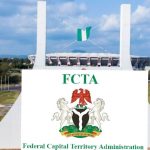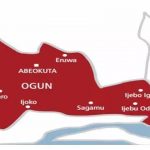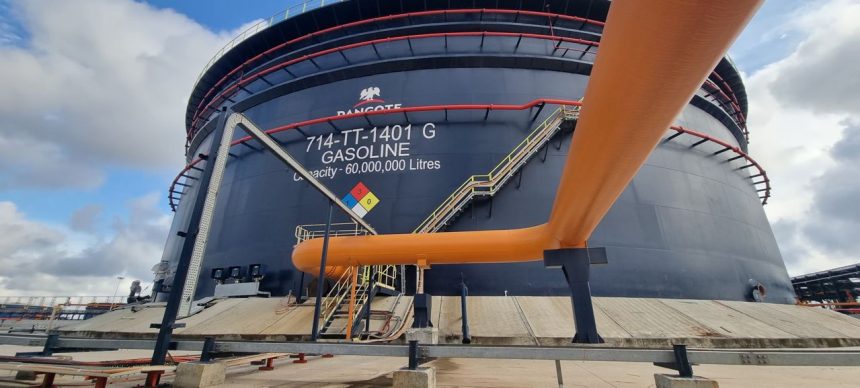The Depot and Petroleum Products Marketers Association of Nigeria has accused Dangote Refinery of destabilising Nigeria’s fuel market with sudden price reductions, warning that the moves are “unpatriotic” and harmful to local businesses already under economic strain.
In a statement on Saturday, the association’s Executive Secretary, Olufemi Adewole, criticised the refinery’s decision to slash its gantry price to N820 per litre. Under the new adjustment, Lagos and other South-West states will see petrol retail at N841 per litre, while Abuja, Rivers, Delta, Edo, and Kwara states will have prices fixed at N851 per litre.
“These reductions were often strategically timed when other importers had active cargoes at sea or in tank, creating price shocks that undermined competition and imposed financial strain on fellow market participants, including the refinery’s own domestic customers,” Adewole said.
DAPPMAN also raised concern that Dangote Refinery was offering lower prices to international buyers than local off-takers. “Even more concerning is the refinery’s pattern of offering lower prices to international buyers while quoting higher rates to local off-takers. This contradicts public-facing claims of prioritising Nigerians and places unnecessary burden on domestic businesses already operating under tight margins,” the association added.
The body further warned about rising tensions between Dangote Refinery and the National Union of Petroleum and Natural Gas Workers (NUPENG). “While the matter may not directly concern our Association, we are alarmed by the tone, trajectory, and escalation of this issue. Beyond the reputational risks to various market participants, we are deeply concerned about the potential impact this may have on ordinary Nigerians, particularly in a downstream environment still stabilising post-deregulation.”
On public claims that Nigeria’s fuel stability rests solely on Dangote Refinery, DAPPMAN dismissed the narrative as misleading. “The assertion that Nigeria’s downstream stability rests solely on one refinery is misleading and dismissive of the broader ecosystem. While we welcome the Dangote Refinery as a major infrastructure project, its contribution has peaked at only 30 to 35 per cent of national demand. The balance continues to be supplied by responsible petroleum product marketers, including DAPPMAN members, who import and distribute under strict regulatory oversight by the Nigerian Midstream and Downstream Petroleum Regulatory Authority (NMDPRA).”
Adewole said DAPPMAN members had for decades ensured uninterrupted fuel supply nationwide, despite subsidy changes, forex challenges, and insecurity. “These contributions deserve recognition, not erasure,” he said.
The association rejected allegations that its members trade in poor quality products. “We reject any insinuation that DAPPMAN members deal in ‘substandard’ petroleum products. All imports are subject to independent, regulator-accredited laboratory testing in accordance with NMDPRA protocols and global quality standards. Ironically, the same refinery alleging superiority has on multiple occasions sought waivers to distribute products with sulphur levels above approved thresholds, a fact that calls into question its consistency and credibility on product quality.”
DAPPMAN also faulted the refinery’s claim of free delivery to buyers. “The claim that the refinery offers ‘free delivery’ is also misleading. In reality, marketers are required to lift at least 25 percent of their allocations directly from the refinery gantry and must do so using only Dangote-owned trucks, paying commercial rates based on their destination. This arrangement imposes additional logistical and financial burdens on marketers, limits operational flexibility, and undermines the narrative of cost relief being provided to the local market.”
While acknowledging the refinery’s role, the association warned against portraying it as the sole driver of the downstream sector. “Dangote Refinery is a valuable contributor, but it is not a messiah. Nigeria’s downstream sector is not driven by one facility alone. It is powered by an ecosystem of refiners, depots, marketers, transporters, and regulators, working in tandem to ensure nationwide access to fuel under often difficult circumstances. We caution against narratives that monopolise credit, shift blame, or undermine the confidence of investors, partners, and the public.”
DAPPMAN reaffirmed its commitment to fair competition, transparency, and collaboration. “We call on all parties, including the Dangote Refinery, to engage constructively and communicate responsibly, avoiding one-sided accounts that can destabilise market confidence. The future of Nigeria’s energy sector lies not in divisive narratives, but in cooperation, regulatory compliance, and mutual respect.”











